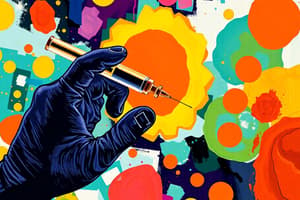Podcast
Questions and Answers
What is the primary focus of immunology?
What is the primary focus of immunology?
- The study of genetic disorders
- The study of how the body defends itself against invaders (correct)
- The study of environmental impacts on health
- The study of human anatomy
Which type of medical intervention is NOT typically associated with immunology?
Which type of medical intervention is NOT typically associated with immunology?
- Biologics
- Vaccines
- Surgical procedures (correct)
- Immunotherapy
Which of the following is NOT a type of cancer immunotherapy?
Which of the following is NOT a type of cancer immunotherapy?
- Cell-based therapies
- Chemotherapy (correct)
- Antibody-based targeted therapies
- Oncolytic viruses
Who is known for developing the vaccination against smallpox?
Who is known for developing the vaccination against smallpox?
What key concept did John Marrack contribute to immunology?
What key concept did John Marrack contribute to immunology?
Which of the following hypotheses involves the immune system's ability to tolerate self-antigens?
Which of the following hypotheses involves the immune system's ability to tolerate self-antigens?
What historical discovery was made by Alick Isaacs and Jean Lindemann in 1957?
What historical discovery was made by Alick Isaacs and Jean Lindemann in 1957?
In which branch of immunology do specialists focus on patients with autoimmune diseases?
In which branch of immunology do specialists focus on patients with autoimmune diseases?
What is the primary function of the innate immune system in the context of immune defenses?
What is the primary function of the innate immune system in the context of immune defenses?
Which of the following is NOT considered an external defense mechanism?
Which of the following is NOT considered an external defense mechanism?
What distinguishes the adaptive immune system from the innate immune system?
What distinguishes the adaptive immune system from the innate immune system?
How does the innate immune system interact with the adaptive immune system?
How does the innate immune system interact with the adaptive immune system?
What is meant by immunologic tolerance in the immune system?
What is meant by immunologic tolerance in the immune system?
Which of the following mechanisms is primarily responsible for recognizing and eliminating foreign microbes?
Which of the following mechanisms is primarily responsible for recognizing and eliminating foreign microbes?
Which of the following is a characteristic feature of the immune system?
Which of the following is a characteristic feature of the immune system?
What role do cytokines and chemokines play in the immune system?
What role do cytokines and chemokines play in the immune system?
Flashcards
What is Immunology?
What is Immunology?
The study of how the body defends itself against invading organisms, like bacteria and viruses, as well as internal threats like tumors.
Variolation
Variolation
Smallpox is a serious infectious disease caused by the variola virus. Variolation was an early method of vaccination using material from smallpox pustules. This risky procedure was practiced in China and India centuries ago.
Immunotherapy
Immunotherapy
A type of therapy that strengthens the immune system to fight cancer.
Biologics
Biologics
Signup and view all the flashcards
Cell-based Immunotherapy
Cell-based Immunotherapy
Signup and view all the flashcards
Immunomodulators
Immunomodulators
Signup and view all the flashcards
Cancer Vaccines
Cancer Vaccines
Signup and view all the flashcards
Oncolytic Viruses
Oncolytic Viruses
Signup and view all the flashcards
Innate Immune System
Innate Immune System
Signup and view all the flashcards
Adaptive Immune System
Adaptive Immune System
Signup and view all the flashcards
Immunological Tolerance
Immunological Tolerance
Signup and view all the flashcards
Immune Response
Immune Response
Signup and view all the flashcards
Antigens
Antigens
Signup and view all the flashcards
Phagocytosis
Phagocytosis
Signup and view all the flashcards
B Cells
B Cells
Signup and view all the flashcards
Immune Memory
Immune Memory
Signup and view all the flashcards
Study Notes
What is Immunology?
- Latin immunitas : freedom from disease
- Study of how the body defends itself
- Covers internal invaders (tumors)
- Crucial medical science for developing treatments and preventing diseases
Healthcare Advances
- Vaccines: Prevent diseases
- Immunotherapy: Boosts the immune system to fight cancer
- Biologics (Monoclonal Antibodies): Target specific aspects of the immune system to combat autoimmune issues
Types of Cancer Immunotherapies
- Cell-based therapies
- Immunomodulators
- Vaccines
- Antibody-based therapies
- Oncolytic viruses
Historical Events
- 5th Century BC: Thucydides observed immunity to plague
- 10th-18th Centuries: Variolation (a method of inducing immunity) against smallpox was practiced by Chinese
- 1798: Edward Jenner developed smallpox vaccination
- 18th Century: Germ theory of disease was introduced by Pasteur and Koch
- 1881: Emile Roux and Yersin isolated diphtheria toxin
- 1884: Elie Metchnikoff studied phagocytosis
- 1890s: Paul Ehrlich identified immune defense systems
- 1890: Emil von Behring and Shibasaburo Kitasato discovered diphtheria antitoxin.
- 1938: John Marrack formulated antigen-antibody binding hypothesis
- 1949: Macfarlane Burnet and Frank Fenner formulated immunological tolerance hypothesis
- 1959: Niels Jerne, David Talmage, and Macfarlane Burnet developed the clonal selection theory
- 1957: Alick Isaacs and Jean Lindemann discovered interferon
- 1962: Noel Warner and team distinguished between cellular and humoral immune responses
- 1968: Anthony Davis and team discovered T cell and B cell cooperation in immune responses
- 1974: Rolf Zinkernagel and Peter Doherty explored major histocompatibility complex restriction
- 1985: Susumu Tonegawa and Leroy Hood identified immunoglobulin genes
Branches of Immunology
- Clinical Immunology: Specializes in immune system deficiencies
Studying That Suits You
Use AI to generate personalized quizzes and flashcards to suit your learning preferences.





